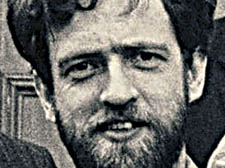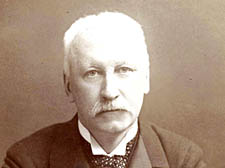|
|
 |
| |

Corbyn in the early 80s |
Corbyn now Islington’s longest-ever sitting MP
IT’S a title that’s been quietly held for 91 years – Islington’s longest serving MP.
So Islington North MP Jeremy Corbyn was shocked on Wednesday when the Tribune rang to congratulate him for surpassing the record held by radical Liberal John Lough for his 26-year reign from 1892-1918.
Mr Corbyn said: “I’m very honoured and chuffed and delighted to follow Mr Lough who supported Home Rule as I do. I’m quite surprised and shocked at the news. It’s a great priviledge and honour to represent the people of Islington. I enjoy every minute of it.”
The 60-year-old MP said he would like to be remembered as “someone who worked hard for the community and maintained his principles in Parliament” and would go on “as long as the people want me and I can do something useful”.
He added: “There’s a great deal to be done. In Islington the issue is dealing with the housing crisis, in Parliament it’s protecting civil liberties, stopping wars and crazy military adventures.”
He estimates he’s held more than 2,000 advice bureaux in his time as an MP adding: “I find the stories people bring about life in Islington and other parts of the world fascinating.”
Mr Corbyn believes the job has become more demanding as communications have become easier: “MPs have to be more hands-on than years ago. Some things that were controversial are now not, such as my meetings with Irish Republicans in the 80s which people now see and the right way to do things.”

Tom Lough: served as a Liberal government minister of education |
Tom Lough,
the forgotten radical
Peter Berresford Ellis tells the story of the man Jeremy Corbyn surpassed to enter the record books
LIKE Jeremy Corbyn, Tom Lough was a political radical.
He was on the radical wing of the Liberal Party and a strong supporter of Irish Home Rule and an active member of the co-operative movement. He held ministerial office, becoming Secretary of Education in 1905 under Campbell Bannerman’s government. He became a Privy Councillor and Lord Lieutenant of his native County Cavan, albeit still supporting the Irish Parliamentary Party and Home Rule.
Lough was born in 1850, the son of Cavan merchant Mathew Lough of Killynebber House. The Lough family were Methodists and traditionally advocates of self-government for Ireland.
Tom’s brother Arthur became a supporter of Horace Plunkett who formed the Co-operative Movement in Ireland in 1890. That same year Arthur inherited a family estate at Drummully House in Kileshandra and turned it into one of Ireland’s most successful co-operatives.
It became the Drummully Co-operative Agricultural and Dairy Society Ltd and a major producer in the movement. Tom was also to become actively involved.
Lough went on to the Wesleyan Connexional School in Dublin, whose pupils numbered George Bernard Shaw, Chaim Herzog (the 6th President of Israel, 1983-1993) and Mervyn Taylor, a co-religionist of Herzog who was leader of the Irish Labour Party and Minister of Labour in the 1990s.
When he was 30 he married a Dublin girl and then moved to London to take charge of a wholesale tea merchant business which he had established with his brothers. Lough Brothers Ltd had offices at 11 Eastcheap, EC3.
He was able to buy a house at 29 Hyde Park. When he sold the house it was bought by the husband of Enid Bagnold. Enid was secretary to the notorious Irish-American author and adventurer Frank Harris. It was the house where she wrote her classic novel National Velvet, first filmed in 1944 starring Elizabeth Taylor.
Tom Lough was a successful businessman who now entered politics, he was a member of the Reform Club, the National Liberal and the City Liberal Clubs. In 1886 he unsuccessfully contested the Parliamentary seat for Truro for the Liberal Party.
He was speaking out on behalf of the Home Rule Union and the Co-operative Movement. He was intensely interested in Irish history and in 1888 he published Glimpses of Early Ireland and became a member of the Royal Society of Antiquaries. He later became a member of the Irish Literary Society.
In July, 1892, he won the seat for Islington West, and was to hold it for nearly 26 years.
Interested in economics, he wrote a hard-hitting polemic in 1896 entitled England’s Wealth, Ireland’s Poverty, followed by Irish Financial Relations in 1901, and then The National Expenditure in 1904 and Irish Finances in 1912, being invited to read the paper before the Royal Society of Economics.
Having served as Secretary for Education from 1905-1908, Tom was appointed Lord Lieutenant of Cavan by Campbell Bannerman, and he remained in that office until his death on January 11, 1922.
It was a difficult position for someone who supported Irish self-government. Cavan was one of the nine Ulster counties and produced many units of the Ulster Volunteer Force pledged to rebel against London if the Home Rule Act was passed on the Statute Book in 1914.
The leader of the Unionist rebellion in Cavan was Arthur Kenlis Maxwell, the 11th Baron Farnham, a Harrow and Sandhurst-educated Hussar office and principal landowner in the county. He and Major Somerset Saundeson, organised the UVF in the county to fight “Home Rule”.
Lough, as Lord Lieutenant, supporting Home Rule, was constantly threatened and with physical violence both to himself and his estate. Life was not easy.
He lost his Parliament seat in Islington West to a Conservative in December 1918. The Tories held the seat until 1923. In Ireland, Sinn Féin won the majority of seats and withdrew from Westminster, declaring UDI.
The War of Independence was fought in 1919-21, followed by the bitter Civil War and the Partition of Ireland. Cavan was one of three Ulster counties that managed to be included in the new Free State rather than in the Partitioned Six Counties.
Four days after the Dáil – the Irish Parliament – had voted in favour of the Anglo-Irish Treaty, Tom Lough died at his London home on January 11, 1922, and was cremated at Golders Green on January 14.
In the turmoil of the time, few newspapers noticed his passing. Obituaries were usually no more than three lines. Sadly, few Islington citizens today, even in the modern radical movement, remember Tom Lough.
• |
 |
|
|
 |
| |
| |
|
 |
|